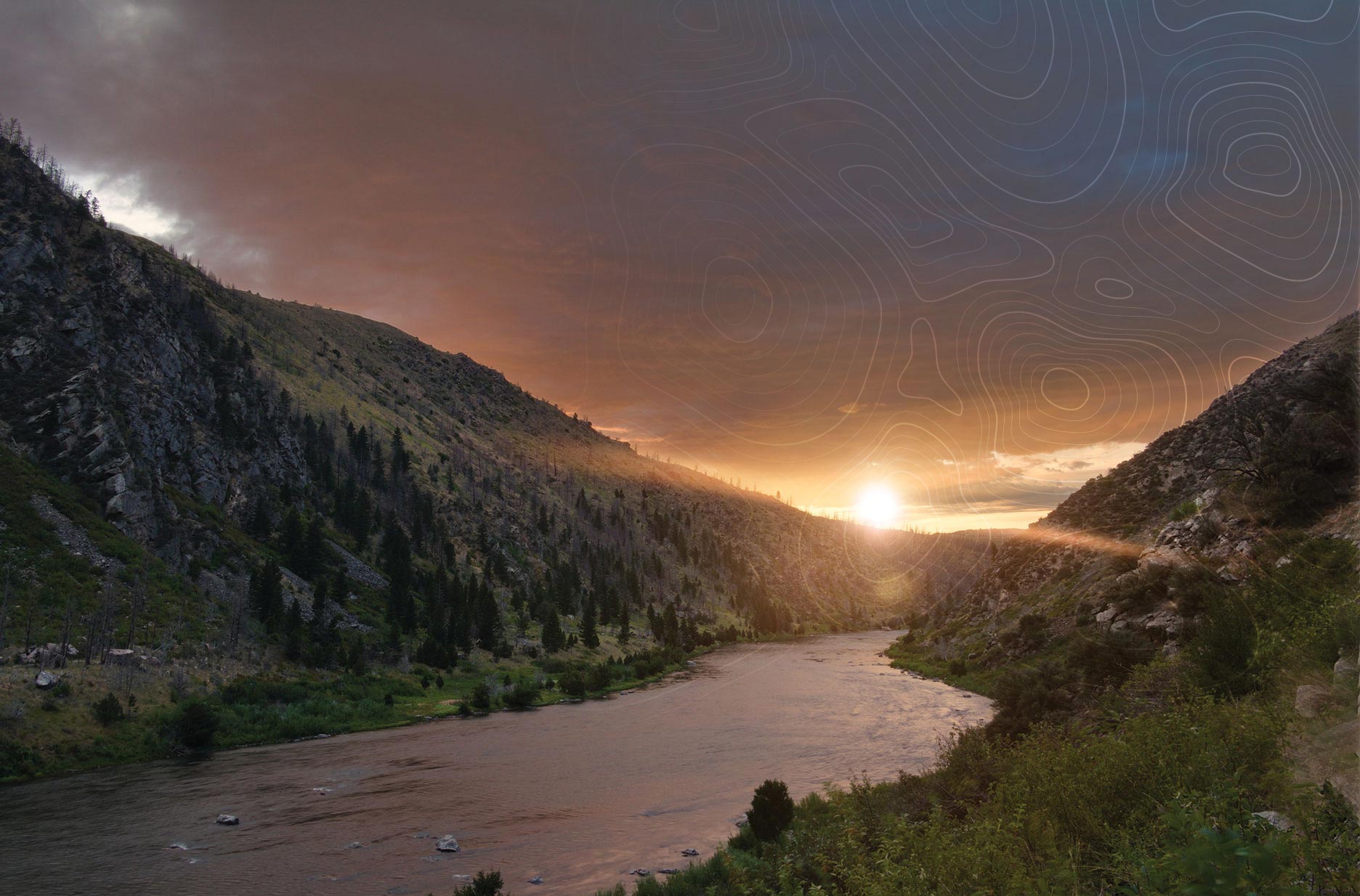Letters from the Pastor
Blog

January 29, 2026
Dear Trailhead family, They were all there at the table. They were all there to eat, yes, but more than that. They were there to remember. And the eating was the pathway to remembering. The food was the monument commemorating the event. What was the event, you ask? Ah, good question. The event was Pesakh. But the story of Pesakh was this. An entire people group was in bondage. Evil was personified in the pharaoh, and the pharaoh built his wealth and influence from the pain and heartache of these slaves. And so they cried out. “Deliver us.” Words born of desperation. “Deliver us!” How many more years of humiliation must we endure? How many more broken bodies? Broken families? Broken hearts? “DELIVER US!” Many years passed, but God had heard the cry. God had seen the evil. God was faithful. God was acting. A plague struck the pharaoh's nation. The nation ignored it. After all, they had gods too. Another plague. More ignoring. But the ignoring was harder. Another plague followed by another. And another. And the evil only intensified. Until. Until death passed over the land. Firstborn males died. Human, animal, death made no distinction. But death did make one distinction. Some homes had blood smeared on the doorframes, the entrance of the house. Blood from a lamb. A lamb without defect. A perfect lamb. That lamb had been killed, and the blood applied over the entrance to the home. And death passed over that house, those people. For the homes that put their trust in God, God protected them. And while death was killing and while God was protecting, the people were to eat a certain meal. And that meal became a memorial. It was called Pesakh. Protected. Passover. So they were all there at the table. They were all there to eat, yes, but more than that. They were there to remember. And the eating was the pathway to remembering. The food was the monument commemorating the event. Bread. Unleavened. While they were eating, Jesus took that bread. The bread. The bread that represented God’s rescue was near. Jesus took the bread, gave thanks for it, broke it, and gave it. The bread that represented God’s rescue was unleavened. Unleavened bread because God’s rescue was so near that there was no time for yeast to do its thing, no time for bread to rise. God’s rescue is at the doorstep. It's at the entrance to our homes, our hearts. It's here. “Take and eat.” This bread that represents God’s rescue being shockingly near, take it and eat it. “This is my body, broken for you.” The rescue looks like a broken body. The broken body looks like a sacrifice. Like a pure and spotless lamb. Then Jesus took the cup. The cup filled with wine. Wine made from grapes. Crushed. Broken. Those grapes had become a dark, somber red, filling the cup. Blood wine. Wine blood. Jesus took the cup, gave thanks for it, and gave it. Drink. Drink of my blood. My blood, new covenant blood. Blood poured out for the forgiveness of sins. The blood of the lamb, protecting from death. One slaughter, many saved. So they were all there at the table. They were all there to eat, yes, but more than that. They were there to remember. And the eating was the pathway to remembering. The food was the monument commemorating the event. And how did they respond? They all deserted him. That. Very. Night. But the body and blood had been blessed and broken and passed out to all who would receive it. Even when those who received it do so as poorly as those first disciples. Because Pesakh wasn’t ever about our fidelity or ability, but God’s fidelity and ability. His love. His concern. His goodness. His exuberant and abounding joy in rescuing. He alone can rescue. And rescue he does. To all who would receive it. So they were all there at the table. They were all there to eat, yes, but more than that. They were there to remember. And the eating was the pathway to remembering. The food was the monument commemorating the event. On the first day of the Festival of Unleavened Bread, the disciples came to Jesus and asked, “Where do you want us to make preparations for you to eat the Passover?” While they were eating, Jesus took bread, and when he had given thanks, he broke it and gave it to his disciples, saying, “Take and eat; this is my body.” Then he took a cup, and when he had given thanks, he gave it to them, saying, “Drink from it, all of you. This is my blood of the covenant, which is poured out for many for the forgiveness of sins. Matthew 26:17, 26-28 Grace and peace be upon you, Grant

January 22, 2026
Dear Trailhead family, The anger was beginning to subside. But just beginning. The anger was still there. Omri had gone from disbelief to outrage and back to disbelief cloaked in outrage. Injustice always did this to him. How could the vineyard owner have treated him so? He’d barely been able to mask his anger when he had returned home. What was supposed to be a joyful homecoming had turned into anything but. It had happened yesterday. Omri was standing in the village center with a few of his cousins and a couple of other men from the town, all desperate to find some work. Omri had promised his wife that morning that he would come home with food or money, and he was determined to fulfill his promise. His wife, Rebecca, had tried to smile through tears, tears brought about by the desperate state they were in. Their daughter was now 3 years old, a little girl who brought them so much joy, but also heartache. Little Sarah’s lungs had never worked properly, and Rebecca or Omri or a member of their extended family was always with the child, if for no other reason than to be with the child when she struggled to breathe. In a life that was already tenuous at the best of times, the attention and money needed to care for Sarah had brought Omri and Rebecca to a place of destitution and despair. And so Omri had kissed Sarah on the head that morning, hugged Rebecca, and, with a stomach cramped from hunger, he waited for work in the marketplace. A few minutes passed, and the other men looking for work found places to wait in the shade. But not Omri. Omri stood in the sun, shouting to every passerby, asking if they had need of a laborer. And his persistence was rewarded. Before the sun was even hot, Omri found himself walking with one of his cousins to a nearby vineyard. Omri wanted to sing or skip! Rebecca would be so happy when he came home with his wages. A denarius had been promised him, respectable wages for a full day’s worth of work. Omri could envision the weight of the promised coin in his hand already. Seemingly floating along, Omri marvelled at how good the day had become. Omri got right to work, and the hours flew by. Before he knew it, the foreman of the vineyard called Omri and the other workers to a shaded area for a short break. Gulping water, Omri saw the vineyard owner walking towards them, trailed by several more of the men who had been in the marketplace that morning. “I’ve got more help for you!” the owner sang out, introducing the new hires to the foreman. Omri watched with curiosity. It was strange to him that the owner, a respected elderly man, was making the trip back and forth to the village to hire more workers. Surely the foreman or one of the other servants could fulfill the task. But the owner seemed to derive pleasure from giving men work, and so Omri shook the thought away, replacing it with the thought of receiving his denarius at the end of the day. Swallowing a bite of fig, Omri stode back into the vineyard, ready to get back to work. The afternoon was hot as usual, but the hired workers had found their rhythm, and the containers awaiting ripe grapes were filling rapidly. Just before evening, Omri found himself emptying his basket of grapes next to one of the men from his village whom Omri had not seen until now. “Jehu! Where did you come from?” Omri asked with surprise. “I just got here,” Jehu replied with a grin. “I had about given up hope of work today, and I was trying to figure out how to break the news to my wife and kids that I had come home again empty-handed, when the owner of this place asked if I wanted to work for him. I said yes before he had a chance to change his mind! Even though I won't get much for these few hours of work, it's better than nothing! And I needed something to go our way, just once; these last few months have been hard on us, on me.” Omri nodded in understanding. He knew the shame of not being able to provide for his family and the desperate thoughts that churned through his mind when that happened. “I’m so happy for you, Jehu!” Omri congratulated his friend, clapping him on the back. “It’s a good day for us both!” The sun was low when the foreman gave a shout, and all the workers made their way back to the center of the vineyard. Once the grapes had been carefully stored away, the men lined up in order of when they had arrived. Omri leaned forward and looked down the line. He was surprised to see so many workers. Apparently, the owner had made quite a few trips into town. From the other end of the line, Jehu caught Omri's eye, and they shared a smile. It was a really good day for their whole village. In his mind's eye, Omri could picture the happy reunions each man had waiting for him at home. Excited family gathering around each worker, joy and laughter filling each home. The foreman cleared his throat and stepped forward. Omri straightened up, expecting the foreman to make his way to Omri’s end of the line, but the foreman headed towards Jehu and the workers who started last. “No matter,” Omri told himself. “The owner can do as he pleases, and we’ll all get what we are owed.” Omri watched as the foreman pulled a few coins from the leather pouch at his belt and handed Jehu and the man next to him their wages. Omri was starting to look away when his head snapped back. Jehu appeared to be crying. “What's going on?” Omri muttered to the man standing next to him as the foreman made his way down the line, handing out the payments. Each group of men responded similarly to Jehu. Startled looks of surprise, shouts of joy, wide smiles from every worker as they were handed their wages. The news traveled down the line faster than the foreman. The latecomers have received a full denarius! Omri's mind spun. Surely this meant that he would receive more than a denarius, more than a full day’s wages. Surely, that's what this must mean! Finally, the foreman arrived at Omri and his cousin, who had started early in the morning. Placing the metal coins in the men's hands, the foreman thanked them. “You worked well today, and my master is grateful for your service,” the foreman said with a smile. Omri tried to reply, but his eyes had fallen to his hand. A denarius. Just one. Just as he had been promised. “But,” Omri sputtered before he could stop himself. “But you paid these other men this same amount! This is unacceptable! It’s unjust!” “Is it?” the foreman replied evenly. “Is it unacceptable for my master to be generous with what is his? Is it unjust for him to pay you what he said he would pay you? Is it unacceptable to you for him to make many homes ring with joy tonight? Is it unjust for these other men to arrive home, heads high with pride at how they have provided for their families?” Jesus said to them… “But many who are first will be last, and many who are last will be first. “For the kingdom of heaven is like a landowner who went out early in the morning to hire workers for his vineyard. He agreed to pay them a denarius for the day and sent them into his vineyard. “About nine in the morning he went out and saw others standing in the marketplace doing nothing. He told them, ‘You also go and work in my vineyard, and I will pay you whatever is right.’ So they went. “He went out again about noon and about three in the afternoon and did the same thing. About five in the afternoon he went out and found still others standing around. He asked them, ‘Why have you been standing here all day long doing nothing?’ “‘Because no one has hired us,’ they answered. “He said to them, ‘You also go and work in my vineyard.’ “When evening came, the owner of the vineyard said to his foreman, ‘Call the workers and pay them their wages, beginning with the last ones hired and going on to the first.’ “The workers who were hired about five in the afternoon came and each received a denarius. So when those came who were hired first, they expected to receive more. But each one of them also received a denarius. When they received it, they began to grumble against the landowner. ‘These who were hired last worked only one hour,’ they said, ‘and you have made them equal to us who have borne the burden of the work and the heat of the day.’ “But he answered one of them, ‘I am not being unfair to you, friend. Didn’t you agree to work for a denarius? Take your pay and go. I want to give the one who was hired last the same as I gave you. Don’t I have the right to do what I want with my own money? Or are you envious because I am generous?’ Matthew 19:30-20:15 Grace and peace be upon you, Grant

January 14, 2026
Dear Trailhead family, Eli was having a hard time hearing. Something about Jonah had been said. Now, that was an interesting story. A prophet, but not a role model. A preacher who did not want his message to be heard. A preacher who definitely did not want his audience to respond. A preacher whose best sermon was halfhearted, angry, and delivered with an acute scent of fish intestines. And then the ending. Not good. Jonah finds a place to observe the destruction of his enemies, but it turns out that Jonah’s enemies were not God’s enemies. Whereas Jonah has contempt, God has mercy. Where Jonah looks for vengeance, God grants grace. To Jonah, this was all too much. Jonah sits under a curiously fast-growing plant, shielded from the sun, sulking. He sits and sulks until the curiously fast-growing plant dies and Jonah is crushed. How he longs for the plant to be restored and once again flourish with life and vitality. Jonah loved the plant, and now it is gone, destroyed. Wilted because of a hungry little caterpillar. “Stupid worm, stupid city, stupid everything,” the prophet concluded. Eli was jostled and came out of his daydream. Another family had arrived, presumably to hear the Teacher. Eli moved over a step, allowing the late arrivals a better view and a better chance at hearing the Teacher. “Do you know him?” one of the newcomers, a lady, asked Eli. “Yes, I mean, no, not really,” Eli said almost coherently. “I mean, I’ve been following the Teacher for a few days now, but I don't know him.” “Could you give him a message?” the lady continued, undeterred by the shaky response from Eli. “Could you tell Jesus that his Mother and brothers are here to speak to him?” Eli shook his head no, even as his mouth said yes. Disappointed in himself and nervous to disrupt the Teacher in the middle of his discourse, Eli slowly made his way inside. Standing this close to the Teacher, hearing his slow, steady speech, caused Eli to pause. The language was clear and precise, but also the language of the streets, of the commoners. And yet his words felt heavy, ripe with purpose and meaning. Simple language, but words that felt like they had been formed millennia ago and were now, finally, being shared. This close to the Teacher, this close to his disciples, made Eli reconsider his mission. To interrupt the Teacher felt blasphemous, akin to desecration. With his mind made up, Eli turned to leave, only to catch the eye of the woman who had commissioned him. “Tell him,” she mouthed. Eli slowly turned around and, before what little remained of his courage could fail him, he blurted out, “Teacher, your mother and brothers are outside; they wish to talk to you!” Eli tried to hide behind the people pressing up against him from all sides, but suddenly, he was alone. Like the Red Sea opening up before Moses, the crowd had parted around Eli, and he stood there with no one between him and the Teacher. The room was utterly quiet, but Eli couldn’t tell for the sound of blood rushing in his head. His stomach hurt, and his legs felt weak. The Teacher was seated on a low stool, and he swiveled his body around to face Eli. Eli gulped and took a step back. The Teacher slowly stood up and locked eyes with Eli. And then one of his eyebrows twitched before lifting into a quizzical look. The questioning eyebrow was followed by a grin spreading across the Teacher’s face, but still he did not speak. “Please, Teacher,” Eli managed through his dry mouth, “your mother and brothers are just outside.” The grin on the Teacher’s face turned into a full smile. Eli’s mind spun. Why was the Teacher only smiling and not moving? Yes, he was significantly younger than the Teacher, but still, he knew when his family asked for him, he was quick to respond. The Teacher finally broke the silence, but kept the smile. “Who is my mother?” Eli nearly gasped, but he was sure his face betrayed the shock he felt. Jesus seemed delighted by the response. “And who are my brothers?” This question seemed directed right at Eli. Eli’s mind spun faster and faster. What was the Teacher saying? Surely this didn’t fulfill the law of Moses and of Yahweh when all of Israel was commanded to “honor your father and honor your mother.” And what about all the other implications? Family was everything. Even when Eli disagreed or had an issue with a member of his family, family was everything. Family was the lifeline in a dangerous and unpredictable world. Family was his source of identity, comfort, shelter, income, community, joy, and refuge. Had the Teacher really just asked who his mother and brothers were, within possible earshot of his mother and brothers? The hush remained as even the disciples appeared to be uncomfortable with the teacher’s question. And then Jesus raised his hand and pointed at one disciple and then another, continuing this as he turned in a circle. “Right here you have my mother.” The crowd craned their necks and stood on tiptoes to see who Jesus was gesturing towards. “And here you have my brothers,” the Teacher continued, turning and pointing. “You see,” the Teacher continued, now pointing at Eli. “Everyone who does the will of my Father is family. Every woman who lives attentive towards God is my mother, and every young girl who is alert to God is my sister, and every man and boy who lives heeding God is my brother. All of us family, all of us looking towards our Father.” While Jesus was still talking to the crowd, his mother and brothers stood outside, wanting to speak to him. Someone told him, “Your mother and brothers are standing outside, wanting to speak to you.” He replied to him, “Who is my mother, and who are my brothers?” Pointing to his disciples, he said, “Here are my mother and my brothers. For whoever does the will of my Father in heaven is my brother and sister and mother.” (Matthew 12:46-50) Grace and peace be upon you, Grant

January 14, 2026
Dear Trailhead family, “Finally,” Jake sighed as he stepped off the ladder and unclipped his tool belt, letting it sag to the ground. With the last piece of trim in place, the house was done. Jake looked around. The house was nice. Very nice. It appeared that no expense had been spared. The best countertops, highest-rated appliances, top-of-the-line fixtures. Brick on the front of the house and on the sides, and on the back. Jake was proud of how the house and property had turned out, and he knew his neighbors in the small lake community were impressed. Walking around the side of the house, he almost bumped into Molly. “It’s done, Honey,” he said while sweeping his hand towards the new home and the fresh landscaping. “It’s better than I even imagined,” Molly said, her eyes suddenly growing moist. Wiping away a tear, she hooked an arm around Jake and gazed at their new place. “Just think of all the memories we will make here,” she murmured. “Kids, maybe even grandkids, will know this house. Birthday parties and holidays and late nights around the fire pit out back. Basketball in the driveway and playing catch in the yard. A glass of wine on the porch at dusk, watching the sun set over the lake.” And then so quiet that Jake almost missed it, Molly whispered, “I love it.” “Me, too,” Jake said, pulling her into a tight hug. A few months later and spring was in full bloom. Molly had planted some daffodils in the flowerbeds, and tulips were blooming in the planters on the porch. Jake and Molly were fully moved in, with not a box to be seen and new art on the walls. Several housewarming parties had taken place, and Molly was constantly burning candles since they had been gifted at least a dozen at those parties. Fresh flowers also dotted the countertops, and the wine cabinet was full. Their friends had been every bit as excited for the new house as they were. One evening in early April, as rain beat against the south-facing windows and the lake was impossible to see through the sheets of rain, Jake, sitting in his favorite recliner and watching his hometown Braves lose to the Cubs in the 9th inning, noticed a small crack in the drywall. Jake had built enough houses to know that drywall oftentimes did crack for various reasons, but this hairline crack was different. Rather than originating from a doorway or window frame, this one ran right down a solid wall. A chill hit Jake as he jumped to his feet to inspect the crack with his thumbnail. A conversation came involuntarily and unwelcome to his mind. “There’s a reason no one had built on this beautiful property before,” the oldtimer had said. “The cost of the piers has scared everyone away.” Jake had wanted the old man to leave at that moment, but since he would be a neighbor before long, Jake also wanted to appear civil. “We’ll work it out.” Jake had replied as a way to end the conversation. And the conversation had ended with the old man getting the hint and shuffling off. But Jake had not worked it out. He had designed the house from the ground up and from the ground down, but he hadn’t gone down very far with the foundation. In fact, he had lied during inspections and had even created fake soil reports to save the expense of sinking deep piers. “After all, sand is rock,” Jake reasoned to himself, “just really small rocks. And rocks make good foundations.” But Jake knew that his cost-cutting measure had caught up to him much faster than he had anticipated as he looked at the crack grow before his eyes and the rain pounded down even harder. “Molly!” Jake yelled up the staircase, a hint of panic in his voice. “Molly, pack some clothes! We have to go!” Thirty minutes later, Jake backed his new heavy-duty work truck down the driveway as he squinted through the rain to see the edges of the concrete. Molly sat next to him, looking deathly pale even with her newly applied spray tan. Lightning flashes revealed a murky picture, but it was all too clear: the rain had eroded large, deep patches of their yard, and the new sod seemed to be crawling away from the house. Before leaving the house, Jake had noticed that the sliver of a crack in the drywall had grown to a quarter of an inch wide and now had a matching crack on the opposite side of the house. “H-h-how could this happen?” Molly stammered, peering towards her home. She shivered even in the warmth of the truck. “The house is new,” she continued, shocked at the impossibility of the nightmare playing out before them. Jake turned the truck around and slowly picked up speed on the winding driveway that partially encircled their home. The next bolt of lightning was accompanied by an instantaneous explosion of thunder, and as both Jake and Molly jumped, a wing of their dream home slumped away from the rest of the house and slowly crumbled like soggy cardboard. Molly screamed, and Jake felt sick at the sight. A quarter mile down the road, he was. “Therefore everyone who hears these words of mine and puts them into practice is like a wise man who built his house on the rock. The rain came down, the streams rose, and the winds blew and beat against that house; yet it did not fall, because it had its foundation on the rock. But everyone who hears these words of mine and does not put them into practice is like a foolish man who built his house on sand. The rain came down, the streams rose, and the winds blew and beat against that house, and it fell with a great crash.” - Jesus (Matthew 7:24-27) Grace and peace be upon you, Grant

January 14, 2026
Dear Trailhead family, “It s-sure is d-d-dark,” Amos managed to get out, once again reminded of why he hated to speak. Micah didn’t do anything to help. “It’s night, dummy. It’s supposed to be d-d-dark!” he taunted Amos’s attempt at conversation and his speech impediment. Amos withdrew back into his own thoughts, thoughts that were always articulate and where his speech came quick and sure. The silence grew between the two shepherds as they gazed into the small fire that provided a little warmth and a safety beacon for anyone who wandered a little too far off when they went to relieve themselves or to check on the sheep. Micah studied his fingernails and used a sharp twig to clean the dirt out from under them. “H-h-h-hoping to impress a w-w-w-women?” Amos said and immediately regretted it. “Naw,” Micah said sadly, his voice betraying that maybe he had been thinking about being in town instead of stuck out in the wilderness for another week or two. A stirring just outside the ring of fire light caused both boys to start and look in the direction of the noise. Two white eyes appeared and disappeared just as quickly. Micah let out a small screech before the eyes appeared again, only this time the face was visible too. “Simeon,” Micah muttered, half in relief and half in annoyance. “What are you doing awake already?” “Can’t sleep,” Simeon stated while rubbing his eyes and stretching. “It’s so dark,” he added, looking at the cloud-covered skies. Amos threw a smug look towards Micah before slowly getting to his feet and making his way a few feet away to pee. And that’s when the angel appeared. Amos screamed. Light was everywhere. Micah appeared paralyzed, his body and mind unable to decide on fighting or fleeing, and so he did neither and froze. Simeon had no such issue and could be heard crashing through the scrub brush. Amos closed his eyes, but the light was there too. “Don’t be afraid,” the angel said with a hearty laugh and an enormous smile. “My news is good!” Micah began to move and slowly edged away from the angel, not looking the messenger in the eye. The light was so strange, as if it was emanating from the ground and sky and the grass and rocks. “My news is for you and everyone!” the angel continued unfazed. “Just today, a rescuer, The Savior, has been born in David’s town. This baby is the Anointed One, the One who all of Israel has been waiting for! David’s throne will once again be occupied, only this time by the Eternal King!” The angel had an uncanny ability to smile widely while speaking loudly. He also didn’t blink, Amos thought to himself, and quickly realized that none of this made any sense. Like, how the light was so bright, and yet there were no shadows because it seemed to be coming from every direction. “Go find this baby,” the angel encouraged, “and you’ll know it's him because he’s wrapped in cloths and sleeping in an animal trough.” “What?” Why?” Simeon had crept back and had caught the final instructions. “Why, what?” Amos wanted to counter his friend, but his mind was still too taken with the light. He was pretty sure he could feel the light over his entire body. Before he could wonder at the light anymore, the entire hillside erupted in angels, angels singing with a deafening exuberance. “GLORY TO GOD IN THE EXPANSE OF THE HEAVENS!” the hillsides echoed. “PEACE ON EVERYONE WHO HAS PLACED THEMSELVES BEFORE GOD!” A cricket chirped. Amos rocked back on his heels as if he had been leaning into a gust of wind. The angels were gone as suddenly as they had appeared. Micah made a choking sound, as if he had forgotten how to breathe. Simeon dabbed at a trickle of blood running down his leg, the scratches from his mad rush starting to sting. “W-we should g-g-g-go,” Amos finally said, a grin growing on his face. Simeon nodded, eyes growing wide. “Heaven just invited us to meet the Messiah. Heaven. Us!” Simeon was usually more articulate than this, but his companions understood. “Bethlehem!” Micah blurted and took off running, his body finally able to function, and the adrenaline hitting hard. Amos laughed and took off in pursuit, Simeon right on his heels. They slowed as they entered the town, eyes peering down every street and alley. Ahead, a man, a stranger, leaned against the wall of a house, breathing deeply. “Friend,” Simeon began at a decibel much too loud, “we are looking for a baby!” Amos expected the stranger to recoil at the news that these filthy boys were running around looking for a baby, but instead, he nodded and smiled. “The baby is right inside.” Joseph said, “Follow me.” * * * * * Amos, Micah, and Simeon eventually made it back to their sheep, but not before telling everyone they knew in town (and quite a few they did not know) about the angels and the baby. As the years passed, Amos kept his ears open for news of the baby. Decades passed with nothing until one day he heard about a rabbi in the north, a rabbi who taught as no one had ever taught before. And the rumor was that this rabbi healed people’s bodies and minds. “That’s him,” Amos mused with certainty. And as he often did, he wondered again why God had chosen him and his friends to share the good news with. And once again, Amos could make no sense of it. No sense, other than to conclude that God had been very good to him. Very good indeed. Grace and peace be upon you, Grant

January 14, 2026
Dear Trailhead family, The marriage had been in the works for some time when the news came out; Mary was pregnant. Not everyone knew, but a lot of people knew. More importantly, Joseph, the husband to be, knew. Joseph’s world was turned upside down. How could this happen to him? How could Mary do this to him? Joseph was embarrassed and felt like a fool. And yet. And yet, Joseph did not hate Mary, nor did he wish to see her punished further. This pregnancy outside of marriage would be plenty for her to deal with. It was almost guaranteed that Mary would never marry now, and she would live with her parents until their death. And then what? Mary’s future was not promising. So Joseph decided not to humiliate Mary further. The proceedings to nullify the engagement would be private. Joseph would move on with his life. So would Mary, with her baby. That was the plan anyways. The plan until last night. You see, last night, an angel invaded Joseph’s sleep with a message. “Joseph, don’t let Mary’s pregnancy derail your marriage to her. Mary has not been unfaithful to you, but rather she has been faithful to God; the baby is God’s! And when the baby is born, you are to give him this name: the Lord Saves! Yes, his name will be Jesus, because this child will save his people.” When Joseph woke up, he tried to dismiss the dream, but he could not. It was a dream, but the dream was real. The dream was as real or more real than the world around Joseph, and so he could not ignore it. Running through Joseph’s mind as his eyes opened that next morning were the words of the revered prophet Isaiah, “The virgin will conceive and give birth to a son, and they will call the child God with Us.” Time seemed to collapse as Joseph considered the words. Those words, memorized by countless Israelites, words of hope and redemption, were happening right here, right now. Joseph didn’t know how he felt about that. But he knew he had to find Mary. And so life went for the next little while. Joseph and Mary kept to themselves to avoid the stares and comments that seemed to follow them anytime they were in public. And they planned to keep this up until their marriage and until the baby was born, but then the ruler of Rome ordered a census. The census required Joseph, a descendant of David, to go to the City of David to be accounted for. And so Joseph and a very pregnant Mary travelled the 90 miles south from Nazareth to Bethlehem to make the ruler of Rome happy. Arriving in Bethlehem, the young couple knew the baby would be coming soon. Because of the influx of travellers, Joseph’s relatives had already given away the guest space to other sojourners, leaving Mary and Joseph the common area of the home, a space also occupied by the homeowners' few animals. And so the baby was born there. The other women in the house cleaned the baby, and Mary wrapped her newborn in strips of cloth, and after feeding him, she placed him in the animals' feed trough. It would have to do. Joseph watched the scene unfold and tried to rectify the angel's words with what was unfolding before his eyes. The messenger had said this child was of Almighty God, and here they were, making do in a space reserved for animals. The words of Isaiah came to Joseph again, words of prophecy about the coming Anointed One. “To us a child is born… a son is given… the government will be on his shoulders.” Joseph looked down on the sleeping newborn. “He’ll be called the most Wonderful Counsellor,” Isaiah continued from long ago, “the Mighty God, the Eternal Father, Prince of Shalom.” The baby yawned and then cried. Joseph looked to Mary before scooping Wonderful Counsellor- Mighty God- Eternal Father- Prince of Shalom into his calloused hands and tenderly placing the boy into Mary’s arms. He kissed Mary and the baby on the forehead and stepped out of the courtyard and into the street. He needed air. None of this made sense. To be continued. Grace and peace be upon you, Grant

January 14, 2026
Dear Trailhead family, The people defined by their relationship with God had not heard from him in quite a while. But they had not forgotten about God, even if it seemed God had forgotten about them. “How long, Lord? How long will you fail to rescue us?” they prayed through tears. The reason they needed rescue was clear. The once proud nation of Israel had been reduced to a vassal state. The Children of God now appeared to be the children of Rome and whoever Rome appointed to rule over them. The local king was Herod. He was not a good man. The local king’s king was Caesar Augustus, whom some thought was divine. He might have thought so, too. At the time of Herod and Augustus, there also lived a man named Zechariah who was married to Elizabeth. Both were old. Zechariah had deep crows' feet around his eyes when we smiled, and Elizabeth had hot flashes at the most inopportune times. They also had no kids, and less we think that was because they were not worthy in some way, that was not the case. Zechariah and Elizabeth loved God, each other, and others. But the people talked and assumed that God had deemed this couple undeserving of children. One day, Zechariah, who was a priest because his daddy was a priest and his daddy’s daddy was a priest and, well, you get the point, Zechariah was serving in the temple. And on that day that Zechariah was serving in the temple, he was chosen to go deeper into the temple, into the part reserved only for God and a carefully prepared priest. The funny thing about it was that in this most sacred place reserved for God, no one expected to encounter God. But Zechariah did. Or rather, he encountered a messenger of God, an angel. Zechariah was doing his duty, burning incense all by himself, when he saw the angel. “Don’t be afraid,” the angel said to Zechariah, but it was too late; Zechariah was afraid. Very afraid. But the angel didn’t spend much time soothing Zechariah. He had news. “Your prayers have been heard,” the angel said with obvious delight. “Elizabeth will birth a son, and you will call him John! Zechariah, listen carefully; your son will be like the renowned prophet Elijah and lead the hearts of parents towards their children and the hearts of the foolish towards right living, and he will make the people ready to meet the Lord!” “I haven’t prayed for a baby in a long, long time,” Zechariah thought. Out loud, he said, “I am old, and my wife is old, and this doesn't seem possible.” “I am Gabriel,” the angel replied, “and I stand in the presence of God. I have been sent to deliver this good news, and this good news will happen. You will mark my words by having none of your own until the baby is born.” Zechariah left the temple, unable to speak, and Elizabeth, the woman who could not conceive, conceived. And what did Elizabeth think about all this? “The Lord has placed his goodness on me, and I’ve been given a new lease on life,” she mused as morning sickness came and her body began to change. Six months later, God was at it again. Gabriel, the messenger of good news to the old and barren, has been given a new message, this time to a young girl. The young girl was named Mary, and she lived up north, in a small village, well out of the way of anything big or exciting. And her life appeared to be set for her; Mary was engaged to a decent man named Joseph. Joseph was ordering his life, work, and housing to welcome his bride into his life. And Mary was waiting for the day when the good news would arrive. “Your husband has come for you! The wedding is today! Come, celebrate your new life!” Only, while Mary was waiting for Joseph and the wedding party to arrive, Gabriel, the messenger of God, showed up instead. “Mary! God’s blessing is all over you!” The exuberant greeting alarmed Mary. Gabriel noticed. “Don’t be afraid, Mary,” he said, “God is delighted with you!” If the angel had stopped here, Mary might have calmed down. But Gabriel was only getting started. “You will conceive a son, and his Father has already named him! Jesus! He will be powerful and called the Son of the Most High, and he will rule forever over all of Israel from David’s throne! His kingdom will never end!” “A baby, you say?” Mary managed to get out. “Where’s the baby coming from?” “God’s going to do it,” Gabriel said with conviction. “The Holy Spirit will visit you, and you’ll be enveloped in the power of Almighty God. And that may not make sense, Mary, but know that your cousin Elizabeth, the old one who couldn't have kids, is pregnant and has been for six months. What God says happens.” Heart still racing, Mary replied, “Let it happen. I am the Lord’s servant.” Once the angel had left, Mary also left to visit her cousin. “Shalom, cousin,” Mary said as soon as she saw Elizabeth. “Are you well?” “Am I well?” Elizabeth grinned, then almost shouted, “Look at you! The lavishness of God is overflowing from you! And it's on me too! My baby is jumping for joy inside of me because of the God-child in you!” “I’m pregnant,” Mary said, realising too late that Elizabeth obviously already knew. “What God says happens,” Elizabeth said through tears of joy, alternating between hugging Mary and holding her at arm's length to look at her. And suddenly, the reality of it all hit Mary. She was pregnant. By God. Her child would be the Son of God. The God who created the cosmos had seen her and chosen her. “Oh wow,” Mary said. “Everything in me loves the Lord, and everything in me is full to bursting with joy in God my Rescuer! He has seen me and loved me, and even though my neighbors may look down on me, history will see this for what it is: extravagant generosity from God himself!” Mary stayed with her cousin for three months before returning home. And Elizabeth had her baby just as God had said, and it was a boy, just as God had said. Eight days later, Zechariah, still unable to speak, and Elizabeth, and many of their relatives and neighbors, took their baby to the temple to fulfil the requirements of the law. Part of the proceedings was to name the child, and all those watching made their opinion known; “He will be called Zechariah,” they mused and loved the idea that referring to Zechariah could mean a stooped old man or a newborn baby. “His name is John,” Elizabeth declared to quiet the people. “But why?” those gathered challenged, “That’s not a family name.” And to further their case, they asked the mute father what to name the child. “His name,” Zechariah began to write. “His name,” those nearest read out loud for those who could not see, “Is,” they echoed as Zechariah wrote, “John.” And as soon as Zechariah wrote “John,” he was able to speak and speak he did! “God has not forgotten us!” was the essence of Zechariah’s many words. And all the neighbors and relatives and those living in the area began to wonder at what was happening and just what was in store. God was up to something. Something big. To be continued. Grace and peace be upon you, Grant

January 14, 2026
Dear Trailhead family, The sun was low in the sky as they made their way towards home. The heat from the daytime sun had been absorbed by the rocks and dirt that surrounded them and was now radiating outwards, but the air had a noticeably cool feel, and the breeze was almost chilly. Jonas pulled his cloak a little tighter as he searched for where to begin. “So,” he finally said, “that was interesting.” Miriam glanced his way before turning back to the path they were following through the Judean countryside. “Yes,” she finally said, “that was interesting. And confusing,” she added with emphasis. “Confusing?” Jonas queried. “What was confusing for you? I found it all to be clear. Too clear.” “Well, for starters,” Miriam said slowly as she gazed into the distance, trying to remember what it was that had so startled her about the Teacher’s words. “For starters,” she began again, “when he said that stuff about the good life. I think it was ‘How good is life for the peacemakers, because they will be called children of God.’ That one really startled me. Because, well, we are Abraham’s descendants. We are the children of Israel, the firstborn of God! So why did the Teacher say that it's the peacemakers who are called children of God?” Both Mariam and Jonas walked in silence, considering the implications of what they had just heard. Words about who lived the good or blessed life, words about what it meant to live the Law not just externally but internally as well, words about loving one’s enemies, and that was just the Teacher getting warmed up! The two continued deep in thought, the words they had heard now running through their imaginations. Words that turned their world upside down. Words that made them question reality, and the reality of their faith and God. If the good life, the life that God was inherently attuned to in his humanity, really did revolve around such things as being poor in spirit, unimportant, hungering and thirsting for right living, right relationships, then where did that leave them? Jonas, a potter by trade, overlaid the Teacher’s words onto his life. Daily, while his hands made beautiful bowls and dishes, his thoughts ran wild with plans to sabotage and undermine the cursed Roman occupiers. And now the Teacher had said an attribute of God’s children was that they would be peacemakers? That did not make sense to Jonas. Wasn’t God dedicated to loving and protecting his people at the expense of all others? Or was God up to something else, something bigger? Jonas hated this line of thought, and yet he could not shake the certainty by which the Teacher had delivered his words. Jonas let out a frustrated sigh and turned to Mariam, “If what the Teacher said is true, then this changes everything,” he said with despair. “My purpose in life is to make those who have hurt us pay dearly for the pain and violence they have shown us. And the Teacher says I am to love my enemies? Pray for those who persecute me?!” Jonas was getting worked up as he spoke, and now his voice trembled. “And the Teacher said that if we live that way, his way, then we will be true children of God?” Jonas kicked a small stone, and it skittered down the path. Miriam glanced his way again, only now to see his shoulders slumped and a tear running down the dust on his cheek. “What is the Teacher getting at?” Jonas asked. “Is he saying that God doesn't really love us all that much after all?” The question hung in the cool night air for several minutes before Mariam replied. “I don’t think the Teacher was saying that we are no longer God’s beloved, but that God has infinitely more love and compassion than we ever expected from him. I think the Teacher was saying that we have always viewed God through our needs and desires, and we had sold him short. I think the Teacher was inviting us to see God as up to much more than blessing or rescuing a few people. I think the teacher was helping us see that God loves people, all people, even the rotten ones.” Then, after a moment, Mariam added in a whisper, “I think the Teacher was inviting us to partner with God in rescuing and blessing all of humanity.” Mariam couldn't tell if her words were helping or hurting Jonas, and so she lapsed into silence, only to have more words from the Teacher run through her mind. “Your Father in heaven causes his sun to rise on the evil and the good, and he sends his rain on those who live right and those who do not,” the Teacher had said. These words exposed a discomforting lack of favoritism from God that Mariam struggled to understand. Mariam let the words and the implications of the words swirl through her mind. If the Teacher was right, her whole thought process, her whole value system would have to change. “Let’s just wait and see what happens,” Jonas suddenly blurted out. “What’s that?” Mariam asked. “Let’s just wait and see what happens,” Jonas repeated. “Either this Teacher will be exposed as a fraud and we can ignore his words, or he will do something that proves he knew what he was talking about.” Mariam considered this, and a part of her wished that the Teacher would be exposed as a charlatan and a con man. But another part of her knew this was not the case. He had spoken with an authority that she could not deny. As much as she dreaded the change that his words required of her, she also sensed something beyond the discomfort and realignment that would be the result of trusting his way. “Was it hope?” she wondered to herself. Yes, but more. “Freedom?” Yes again, but still more. “Life?” Ah, yes, that was it, Mariam thought. Life. The Teacher’s words had felt like coming up out of water and blowing out the old, depleted air and breathing in new, vibrant, life-giving air. Mariam understood why Jonas would want to wait and see what came of the Teacher, but as for her, the Teacher’s radical, challenging, frustrating words had sparked life in her. Life that she wanted, no matter the cost. Grace and peace be upon you, Grant


